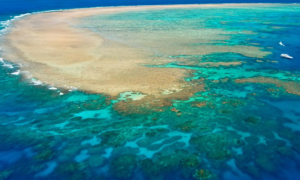Physical Address
23,24,25 & 26, 2nd Floor, Software Technology Park India, Opp: Garware Stadium,MIDC, Chikalthana, Aurangabad, Maharashtra – 431001 India
Physical Address
23,24,25 & 26, 2nd Floor, Software Technology Park India, Opp: Garware Stadium,MIDC, Chikalthana, Aurangabad, Maharashtra – 431001 India

Introduction
The seas surrounding Australia’s Great Barrier Reef have reached their highest temperatures in 400 years, according to a groundbreaking study published in Nature recently (August 7) . The research highlights the severe impact of climate change on the reef, fueling concerns over its future and renewing calls for it to be classified as an endangered World Heritage site.
Historic Temperature Rise
Recently, researchers from Queensland and Wollongong Universities have discovered that the waters in the Coral Sea have reached unprecedented temperatures, driven by human-induced climate change. The study reveals that recent summers, including those in 2024, 2017, and 2020, have experienced the warmest waters since at least 1618. This heat is contributing to increasingly frequent coral bleaching events, which threaten the reef’s vibrant ecosystem.The study can be found here
Bleaching Events on the Rise
Coral bleaching occurs when corals, stressed by warmer waters, expel the algae that provide them with color and nutrients. The study found that mass bleaching events have become significantly more common since 1980, with recent coral cores showing multiple stress bands corresponding to these events. In contrast, such stress indicators were rarely found in coral cores from before the 20th century, indicating that severe bleaching was a much rarer occurrence.
UNESCO World Heritage Status Under Scrutiny
The Great Barrier Reef, listed as a UNESCO World Heritage site in 1981, has been at the center of a debate over whether it should be designated as “in danger.” The Australian government has resisted this classification, fearing it could hurt tourism and increase pressure for stronger climate action. However, the new study provides compelling evidence that may lead to a reassessment of the reef’s status.
Professor Ove Hoegh-Guldberg from Queensland University criticized UNESCO’s recent decision to keep the reef off the endangered list, arguing that the new data should prompt a reconsideration. Dr. Ben Henley, the study’s lead author, hopes that the findings will lead to increased global action to combat climate change and protect the reef.
Global Warming’s Broader Implications
The researchers emphasized that the Great Barrier Reef’s plight is a warning sign for coral reefs worldwide. Professor Helen McGregor of Wollongong University described the situation as a “coral in the coal mine,” suggesting that the health of the reef is an early indicator of the broader impacts of global warming on marine ecosystems.
Future Conservation Efforts
In response to UNESCO’s concerns, the Australian government has committed to implementing a comprehensive action plan to protect the reef. This plan will be reviewed in 2026, with further measures potentially required. The study underscores the need for urgent and decisive global action to reduce greenhouse gas emissions and protect coral reefs from the escalating threat of climate change.
Sources : SkyNews | Nature Magazine